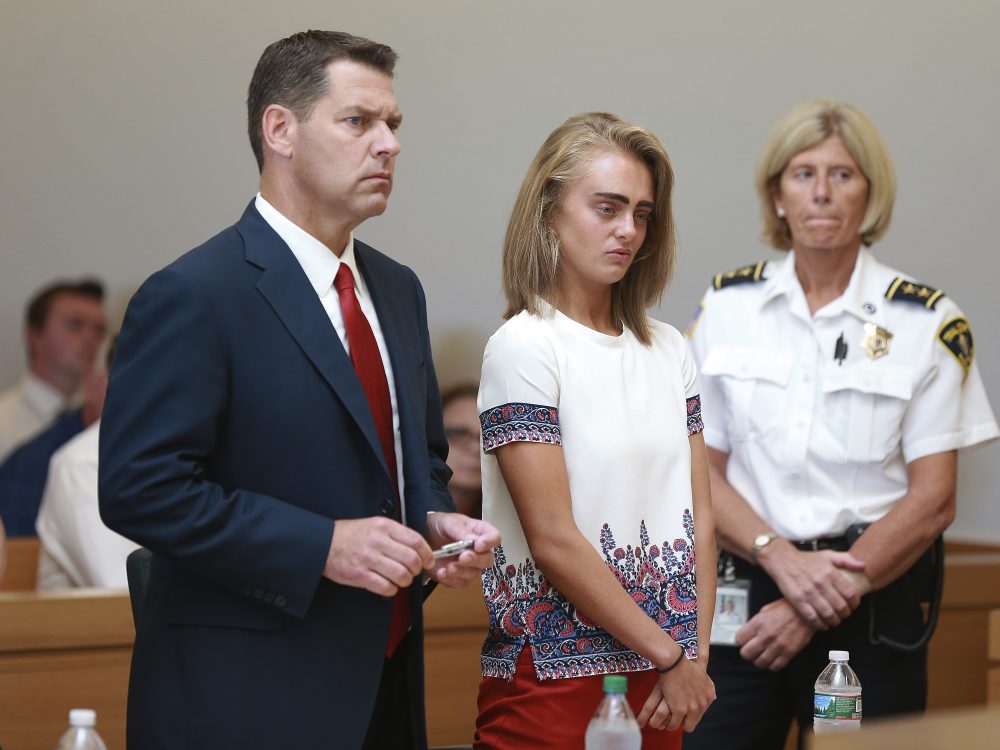Advertisement
Mass. Justices Hear Appeal In Texting Suicide Conviction

The controversial 2017 conviction of a teenager for urging her boyfriend via text messages and phone calls to kill himself is once again before the state's highest court.
Massachusetts Supreme Judicial Court justices heard arguments Thursday on the appeal of Michelle Carter's involuntary manslaughter conviction for sending text messages to her 18-year-old boyfriend, Conrad Roy, encouraging him to kill himself by getting into his carbon monoxide-filled truck.
Her attorneys argued that prosecutors did not adequately prove that Carter, who was 17 years old at the time of Roy's death in 2014, is responsible.
Carter's attorney, Daniel Marx, said the case raises a lot of questions: about the definition of involuntary manslaughter — especially for juvenile defendants; and about freedom of speech and whether someone can be held responsible for the death of another person based on words they said or wrote — especially in a state that has no so-called assisted suicide law against urging someone to take their own life.
"I think the court clearly is wrestling with a number of problems — factual problems at the trial, statutory problems, constitutional problems," Marx said. "They get that this is a complicated issue, which is why almost every other state in the country has a law to deal with ... assisted suicide."
The justices asked both Marx and Bristol County prosecutor Shoshana Stern about how any ruling could affect assisted suicide cases. Stern said it's likely that a ruling from the high court could affect a variety of instances in which someone knows about or is involved in another person taking their own life. Marx said questions like that should be answered by the Legislature, not the courts.
"Can you tell an elderly relative who's suffering from pancreatic cancer — one of the examples discussed — to take sleeping medication? Can you go out and buy that for them?" Marx told the justices. "There are all kinds of complicated questions here that should be decided by the Legislature with a statute and should not be decided in the context of this very unusual and tragic situation."
Marx argued that Carter's admission that she urged Roy to get back into his truck was in a text message to a friend two months after Roy's death, and that is not sufficient evidence for a conviction.
"The crux of the case is the claim that she told him to get in the truck," Marx told the justices. "None of the facts corroborate that."
Prosecutors say that confession via text to her friend is consistent with other cellphone evidence.
Carter's attorneys also argued that Lawrence Moniz, the juvenile court judge in Carter's bench trial, “wrongly convicted Carter for a wanton and reckless failure to act.” Marx said prosecutors could not definitively say what Carter might have told Roy in phone calls on the day he killed himself and whether help would have arrived in time to prevent his death.
Marx also said Carter was as vulnerable as Roy, and she had left inpatient mental health treatment just weeks before his death.
Carter, who was not in the courtroom on Thursday, was sentenced last summer to 15 months in jail but has remained free while she appeals the conviction.
About a dozen family members and friends of Roy watched the proceedings.
This is the second time the high court has heard arguments about this case. In 2016 the SJC ruled that Carter could stand trial for involuntary manslaughter. The justices said her "verbal conduct" was sufficient for an indictment on the charge.
The SJC has 130 days to issue a written opinion in this case.
